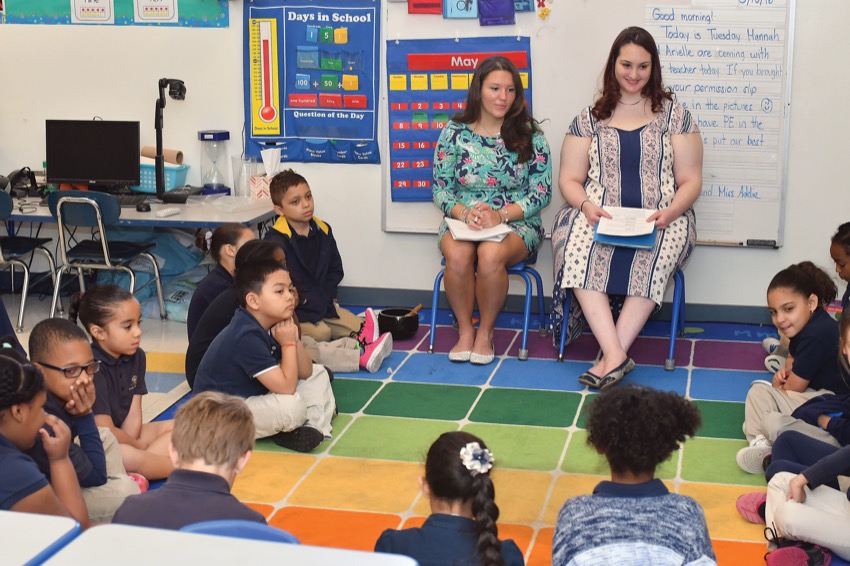Teaching the power of presence

There is a difference between being present (showing up), and really being present (purposefully aware of everything that is happening in each moment). The students at the Paul Cuffee Charter School in Providence, R.I., learned to put into practice the latter, courtesy of Professor of Education Mary Lee Griffin and her student collaborators.
Griffin has been working to spread mindfulness techniques in five local schools for years, and has provided many Wheaton students with training to carry out the ongoing work and secured experiential learning opportunities for them. During the spring semester, Hannah Zack ’18 and Arielle Klopsis ’18 spent six weeks collaborating with Griffin and for the first time implementing on their own the mindfulness protocols developed by Griffin to help elementary school children improve their educational experience and even their interactions outside of the classroom.
Zack, a psychology and sociology double major, and Klopsis, a member of the varsity tennis team and a neuroscience and Hispanic studies double major, worked with three fourth grade classes and one first grade class. The lessons focused on inspiring kindness, mindful eating, and listening and visualization, and offered various breathing techniques to control emotional responses.
One morning in May, a group of first graders in the classroom of Brooke Alam Beach ’07 sat on a rug in a circle as Zack and Klopsis led them through a meditation exercise.
“Did any of you use your mindfulness this week?” Zack asked afterward.
Each student took turns answering. “When I was playing outside my brother kicked my leg,” one girl reported, “and I took a deep breath [before reacting].”
“That’s really great,” Zack told her.
In addition to encouraging students to talk about their experiences, Zack and Klopsis also asked them to write in journals throughout the week.
Beach, who majored in anthropology with a minor in elementary education, has been teaching at the charter school since 2009.
“The curriculum at the Paul Cuffee school has always had a strong focus on social-emotional learning. We have worked really hard to teach children how to be self-aware, resilient and to empower themselves,” said Beach. “The mindfulness techniques lend themselves to these goals so naturally. I also believe that exposing kids to these techniques early on helps them learn the value of self-talk and in turn allows for greater risk taking. When kids are truly present and are able to regulate their feelings and emotions, incredible learning can take place.”
Professor Griffin, whose research has included exploring mindfulness practices and their effect on young readers and writers, has incorporated the practices into several of her courses at Wheaton.
“I really enjoy working with the Wheaton students,” said Griffin. “They bring a youthfulness to this work, real enthusiasm and passion.”
Both Klopsis and Zack, who did this work as an independent study course, say they have learned a lot about managing a classroom and drawing students out of their shyness so that they can express themselves.
“The work is important because there has been research done to show that mindfulness can affect cognitive processes and physical brain structures,” said Klopsis. “We have also seen a lot of improvement with gratitude and being thankful for the little things that they have.”
Added Zack: ”They loved asking questions about college and I think they looked at us as role models. It doesn’t take a lot to make an impact in someone’s life.”
Photo by Keith Nordstrom
